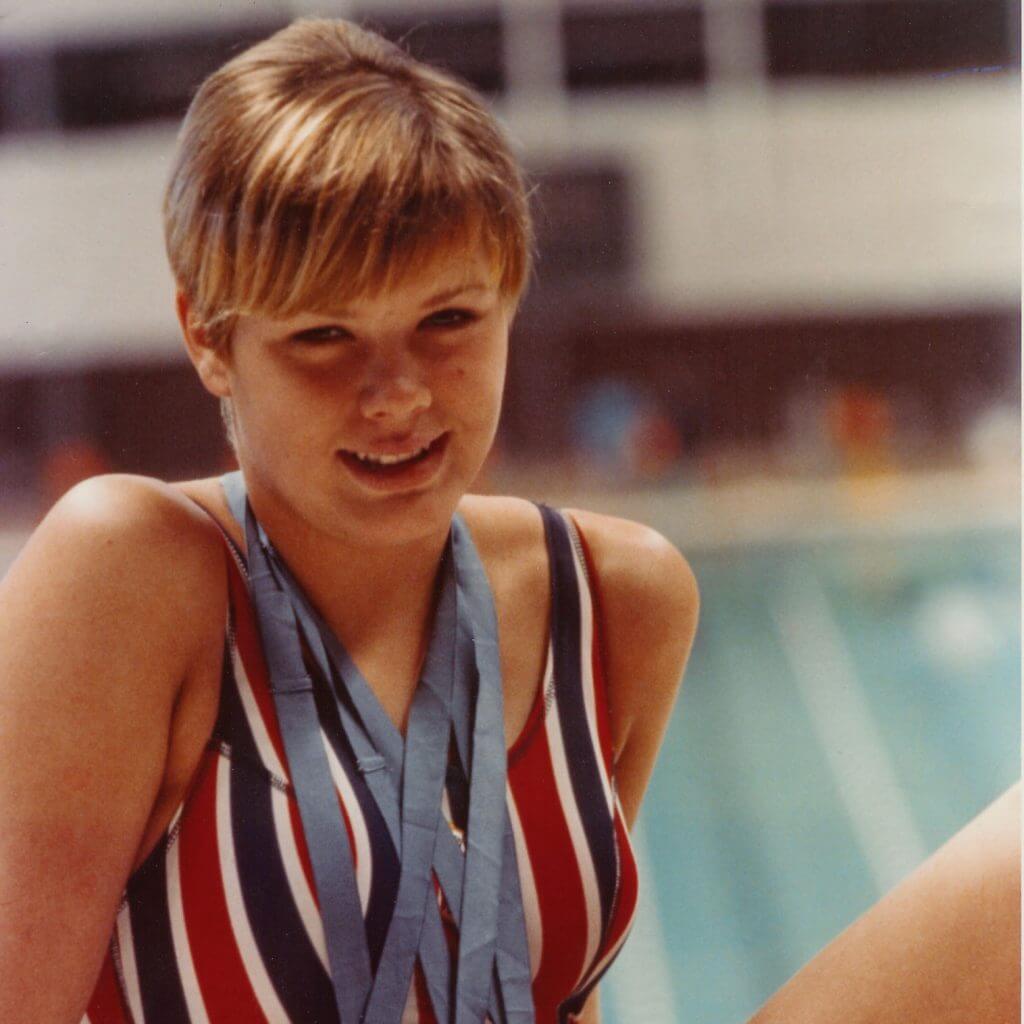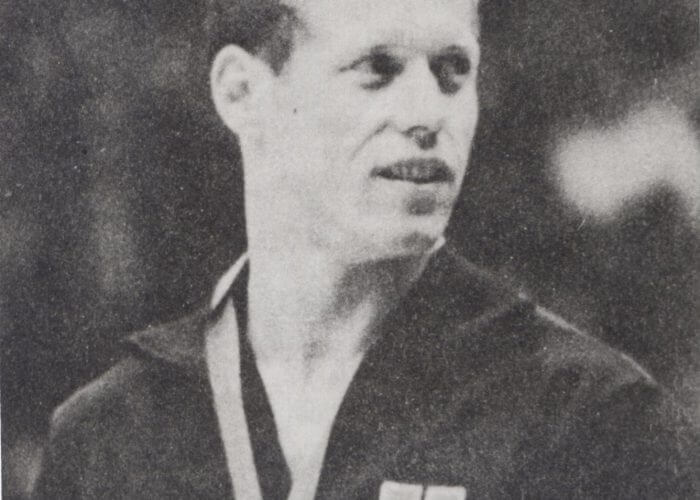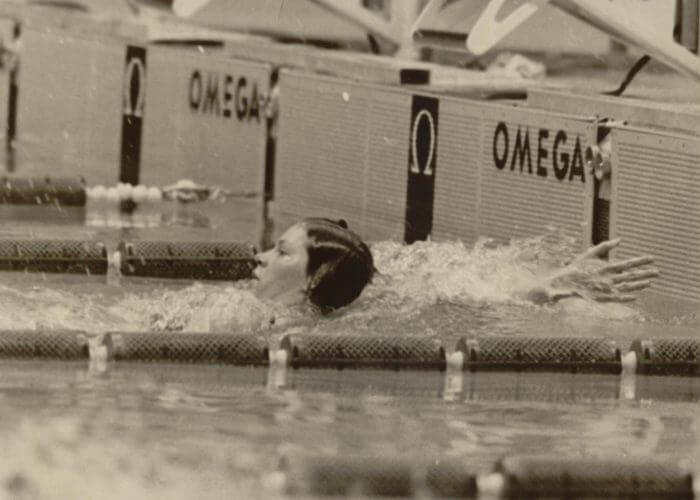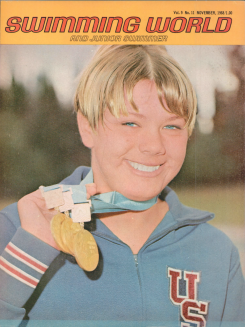50 Year Lookback of 1968 Mexico City Olympics: Debbie Meyer Wins First Gold Medal on Day Four

Each day through October 26, Swimming World will take you back 50 years to the 1968 Mexico City Olympics, and will re-tell the stories of those Games through archived meet recaps via the Swimming World Vault.
Read More on the 1968 Olympics
- Mark Spitz’s first gold medal
- Micki King hits board in 3m springboard final, Sue Gossick wins gold medal
- Major upsets rock pool on day three
October 20, 1968
Men’s 3m Springboard
The men’s three-meter springboard title went to Bernie Wrightson, USA, who won easily with 170.15 points. The victory matched Sue Gossick’s American triumph in the women’s three-meter.
Bernie, 24, led after the preliminary round over Klaus Dibiasi, Italy, who eventually grabbed second in the finals with 159.74 points, while Tord Anderson, Sweden, who was third in the prelims, faltered in the finals as Jim Henry, USA, came from fourth to take third with 158.09 points.
After the second round of dives Henry led with Dibiasi second and Wrightson third. Keith Russell, USA, was fourth, Anderson fifth, and Luis Nino de Rivera, Mexico, was in sixth place going into the finals.
In the pressure packed finals, Wrightson blew the competition open with his great crowd pleasing diving. He moved into first place and hung onto the gold medal spot after his eighth dive, a reverse with two and one half somersaults and two twists (22.96 points). His ninth dive was a back two and a half somersault with two and a half twists (21.28 points). Bernie’s final dive was a reverse one and a half somersault with two and a half twists for 22.96 points, the highest in the competition.
Dibiasi dove well and consistently and remained in second place after Henry missed his chance to take the silver medal on his last dive getting only 15.66 points. Mexico’s de Rivera was fourth with 155.71, Franco Caguotto, Italy, fifth 155.70, Russell sixth, 151.75, Anderson seventh, 151.50, and Donald Wagstaff, Australia, finished eighth with 150.18 points.
The victory by Wrightson kept the United States Olympic streak alive. The U.S. now has won the last 11 springboard titles.

Bernie Wrightson; Photo Courtesy: International Swimming Hall of Fame (ISHOF)
Quotes:
Wrightson who just missed making the 1964 U.S. Olympic Team, spoke of his new style of diving: “I’ve been doing the same dives for the last six years but now I communicate more with the audience. It’s something I learned from the Russians and have done in exhibitions. You smile and the audience gets with you and you get with the audience, and most important of all, it relaxes the judges because the judges are very apprehensive. They don’t want you to miss a dive. If you seem relaxed, they relax. Diving is an unstable sport. Jim beat me in the Olympic Trials and I won here. We could do this again tomorrow and the results would be different. My best dive depends on the day. This is my last meet.”
Dibiasi, 21, stated: “I didn’t realize the Mexican (de Rivera) was so close because I was too concerned with my own diving. I didn’t expect to win a medal from the three-meter but rather from the 10 meter platform.”
Bronze medalist Jim Henry, 20, is a student at Indiana University (His coach, Hobie Billingsley, is the Olympic Diving Coach) was fully aware of his competition. “Oh yes, I knew where everybody was, I was third by this much (an inch).”
Medalists:
- Bernie Wrightson, USA, 170.15
- Klaus Dibiasi, ITA, 159.74
- Jim Henry, USA, 158.09
Historical Notes:
- The American streak was broken four years later in 1972 when Soviet Vladimir Vasin won the gold while American Craig Lincoln won bronze.
- This was Dibiasi’s first and only Olympic medal in a springboard event as he won Italy’s first springboard Olympic medal as well.
- This was the first Olympics the Americans did not go at least 1-2 in the men’s 3m since 1912.
- The Americans won this event four more times at the Olympics but have not won since 1992 with Mark Lenzi.
- Wrightson was inducted into the International Swimming Hall of Fame in 1984.
Women’s 200 IM
Claudia Kolb, USA, dominated the women’s 200 meter individual medley, as expected. She was the fastest qualifier at 2:28.8 and roared through the finals, swimming with ease and was never pushed as she won in 2:24.7 (Olympic record, new event). Her splits were 31.7, 1:08.3, 1:50.8 and 2:24.7. She was actually ahead of her world record during the race as her world splits are 30.8, 1:08.5, 1:50.8 and 2:23.5.
Claudia false started in the race, which seemed to irritate the competitors. She explained she hates to false start but wanted to get into the pool and the officials wouldn’t let her. From the moment the gun went off it was Claudia Kolb’s race. She assumed the lead early in the butterfly and touched first at the turn. She continued to maintain the lead as she swam a strong backstroke. It was here Sue Pedersen had to make her move but it failed to materialize. Then Claudia opened a wide lead in the breaststroke and came home easily in the freestyle to win by about six meters over Miss Pedersen.
Sue Pedersen, USA, was second in 2:28.8 in a fairly easy swim for the 15-year-old. The best race was for the bronze medal as Sabine Steinbach, East Germany, who was in third all the way, was touched out be Jan Henne, USA, who was sixth at the 100 meter mark, clocking 1:15.2. Both girls clocked 2:31.4.
Fifth went to Yoshimi Nishigawa, Japan, 2:33.7 (2:31.5 in prelims), followed by Marianne Seydel, East Germany, 2:33.7 (2:32.8 in prelims), Larisa Zakharova, USSR, 2:37.0 (2:34.6 in prelims). Shelagh Ratcliffe, Great Britain was disqualified for a one hand touch on breaststroke (2:34.9 in prelims).

Photo Courtesy: Swimming World Archive
Quotes:
Miss Kolb, 18, said “My breaststroke helps me pick up the most. It’s my best medley stroke. I’m not surprised at the time, after Colorado I thought I might go a 25. We talked about the other girls weaknesses and strong points, because we wanted to make it 1-2-3 for the U.S.”
Jan Henne, 21, commented about her race “I’m always behind. My butterfly is not very good and my backstroke is getting worst, but I always pick up on the breaststroke and freestyle.”
Medalists:
- Claudia Kolb, USA, 2:24.7
- Sue Pedersen, USA, 2:28.8
- Jan Henne, USA, 2:31.4
Historical Notes:
- This was the first time the women’s 200 IM was contested at the Olympics as it was the debut of six new women’s events. The 100 breast, 200 free, 800 free, 200 back, 200 fly and 200 IM made their Olympic debuts in 1968.
- The Americans have only won this event twice at the Olympics with Kolb’s gold in 1968, and Tracy Caulkins in 1984.
- The United States, China, Australia and the Ukraine have each won this event twice at the Olympics.
- Kolb was inducted into the International Swimming Hall of Fame in 1975.
Men’s 200 IM
The men’s 200 meter individual medley proved to be a one man show as Charles Hickcox, USA, won in 2:12.0 (Olympic record, new event).
Charlie stroked into the lead in the butterfly with a strong medium turnover to touch first at the turn in 27.8 ahead of teammate John Ferris, whose best stroke is the butterfly. John was unable to slice into Hickcox’s lead, but Greg Buckingham, USA, came on in the breaststroke to pass Ferris as did Juan Bello, Peru. Charlie was 1:00.5 at the I00 and 1:42.3 at the 150 meter mark and he finished in 2:12.0. The race was for second as Hickcox was never seriously challenged. Buckingham was second, 2:13.0, Ferris third, 2:13.3, and Bello fourth, 2:13.7, as Ferris closed fast to pass the Peruvian. Fifth went to George Smith, Canada, 2:15.9, followed by John Gilchrist, Canada, 2:16.6, Michael Holthaus, East Germany, 2:16.8 and Paul Lazar, Hungary, 2:18.3 (2:17.1 in prelims). Ferris swam so hard a race that he collapsed right on the victory stand after receiving his bronze medal.
Quotes:
“Greg, Ferris and I, thought it would take a 12 to win,” said Hickcox, 21. “I was just lucky enough to get down there. My butterfly and backstroke are my best two strokes. I try to get out hard on the butterfly and come back on the backstroke easy but staying on pace, hold the breaststroke, and then give it everything on freestyle. A win here is enough. If I’d have gone 2:19 and won I’d be very happy.”
Buckingham, 23, said: “My layoff didn’t hurt me, the 200 is mostly a sprint anyway. I was in good shape a month ago and then I got sick and I’ve been in and out of the water ever since. I don’t think Charlie (lane 3) could see Bello (lane 8) but I could and he was ahead of me after the breaststroke, so I buried my head and hoped I could beat him. Nothing is wrong with Ferris, he just didn’t get enough oxygen for as hard a race as he swam.”
Bello commented that he thought he could have won, but he worked so hard on breaststroke that he didn’t have anything left to challenge the Americans with in the freestyle.
Medalists:
- Charlie Hickcox, USA, 2:12.0
- Greg Buckingham, USA, 2:13.0
- John Ferris, USA, 2:13.3
Historical Notes:
- This was the first time this event had been contested at the Olympics as it was one of three new events to the men’s program. The 100 fly and 100 breast were the other two.
- The Americans did not win the 200 IM at the Olympic Games again until 2004 when Michael Phelps won the first of four golds in the event.
- The Americans have five gold medals in the event while Hungary has three.
- Charlie Hickcox was inducted into the International Swimming Hall of Fame in 1976.
Women’s 400 Free
Debbie Meyer proved beyond doubt that she alone is the world’s queen of freestylers. In the 400 meter event, Miss Meyer posted a 4:31.8 to beat teammate Linda Gustavson, 4:35.5, and Australia’s Karen Moras, 4:37.0, while another American girl, Pam Kruse, was fourth, 4:37.2.
Finishing in fifth place was Gabriele Wetzko, East Germany, 4:40.2, trailed by Maria Teresa Ramirez, Mexico, 4:42.2, Angela Coughlan, Canada, 4:51.9 (4:47.4 in prelims), and in eighth position, Ingrid Elizabeth Morris, Sweden 4:53.8, (4:51.6 in prelims).
The race was a typical Debbie Meyer swim. The 16-year old California flash went out hard and at 100 meters enjoyed a two length lead over Miss Wetzko. She held this same margin at 200 meters and at 300 meters as Miss Gustavson, moved into third at 300 meters. Pam Kruse and Karen Moras battled it out for third, with Karen holding off the late charge of Miss Kruse.
Miss Meyers splits were 1:04 1, 2:13.6, and 3:23.5. Debbie’s 4:31.8 set a new Olympic record.
Quotes:
After the race, Debbie said, “The rest of the world is catching up because they are copying a lot of our techniques. I was aware of everybody in the race. I think the U.S. is ahead in training because we have better facilities and can train all year round.” She concluded, “Our coaches are good and that makes us tougher.”
Miss Gustavson, 18, talked of the strategy that she and Coach Haines worked out, “I wanted to go out a little behind Debbie and then start picking it up at the 200 and really work it from the 250 to the 350. I thought I had a chance to win it,” Linda said.
Miss Moras, 14, said: “I thought I could do well here. My times have been dropping since our championships in February. It’s not my best time (She’d done a 4:34 + at Mexico City just before the competition), but I’m happy. I did think I had a good chance for second though.”
Sherm Chavoor said “Debbie swam a good race, but I was worried, even though she’s four or five seconds ahead of the other girls, because of altitude. Now that I look back on it she won like she should have. Moras is a tremendous little swimmer, she’s only 14, and she could be tough.”
George Haines said, “Most of the girls are out slow at altitude and you have to figure the time will be off 7 seconds in a 400 and 15-16 seconds in an 800.”
Medalists:
- Debbie Meyer, USA, 4:31.8
- Linda Gustavson, USA, 4:35.5
- Karen Moras, AUS, 4:37.0
Historical Notes:
- Debbie Meyer was inducted into the International Swimming Hall of Fame in 1977.
- This was the third straight gold medal for the Americans in the 400 free as they have won it eleven times overall, with the latest being Katie Ledecky in 2016.
- Meyer graced the cover of Swimming World in 1968 for her efforts in the Mexico City Olympics.




